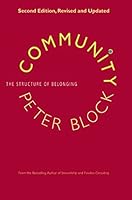
Community

Collaborating with the Enemy: How to Work with People You Don’t Agree with or Like or Trust. San Francisco: Berrett-Koehler, 2017.
Peter Block • Community
What is a commitment or decision that you have changed your mind about? What forgiveness are you withholding? What resentment do you hold that no one knows about?
Peter Block • Community
What doubts and reservations do you have? What is the no, or refusal, that you keep postponing? What have you said yes to that you no longer really mean?
Peter Block • Community
The all-purpose ownership question: What have I done to contribute to the very thing I complain about or want to change?
Peter Block • Community
The future hinges on the accountability that citizens choose and their willingness to connect with each other around promises they make to each other.
Peter Block • Community
Communities are human systems given form by conversations that build relatedness.
Peter Block • Community
A shift in social capital occurs when we decide that the real transformation is having citizens—strangers up to now—sitting in circles, learning to trust each other, and deciding how to make a place better.
Peter Block • Community
Building community and belonging in a dominant culture that is based on individualism, competition, and autonomy is difficult work.
Peter Block • Community
They operate as if every player in the setting is a cocreator of outcomes. That each patient and patient’s family are enough. That they have it within their means to produce health, and that the professional service provider exists to support health, not capitalize on disease.